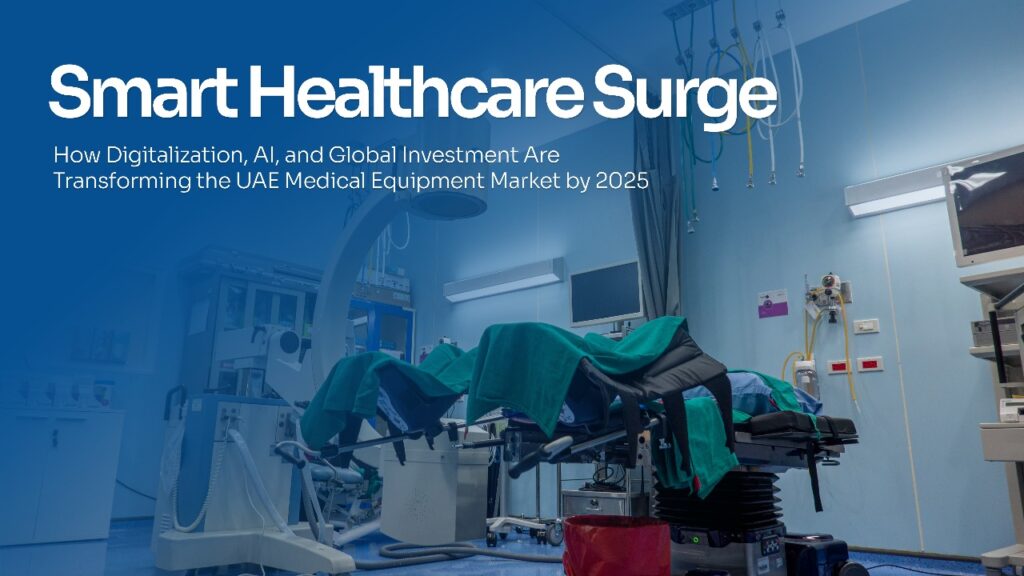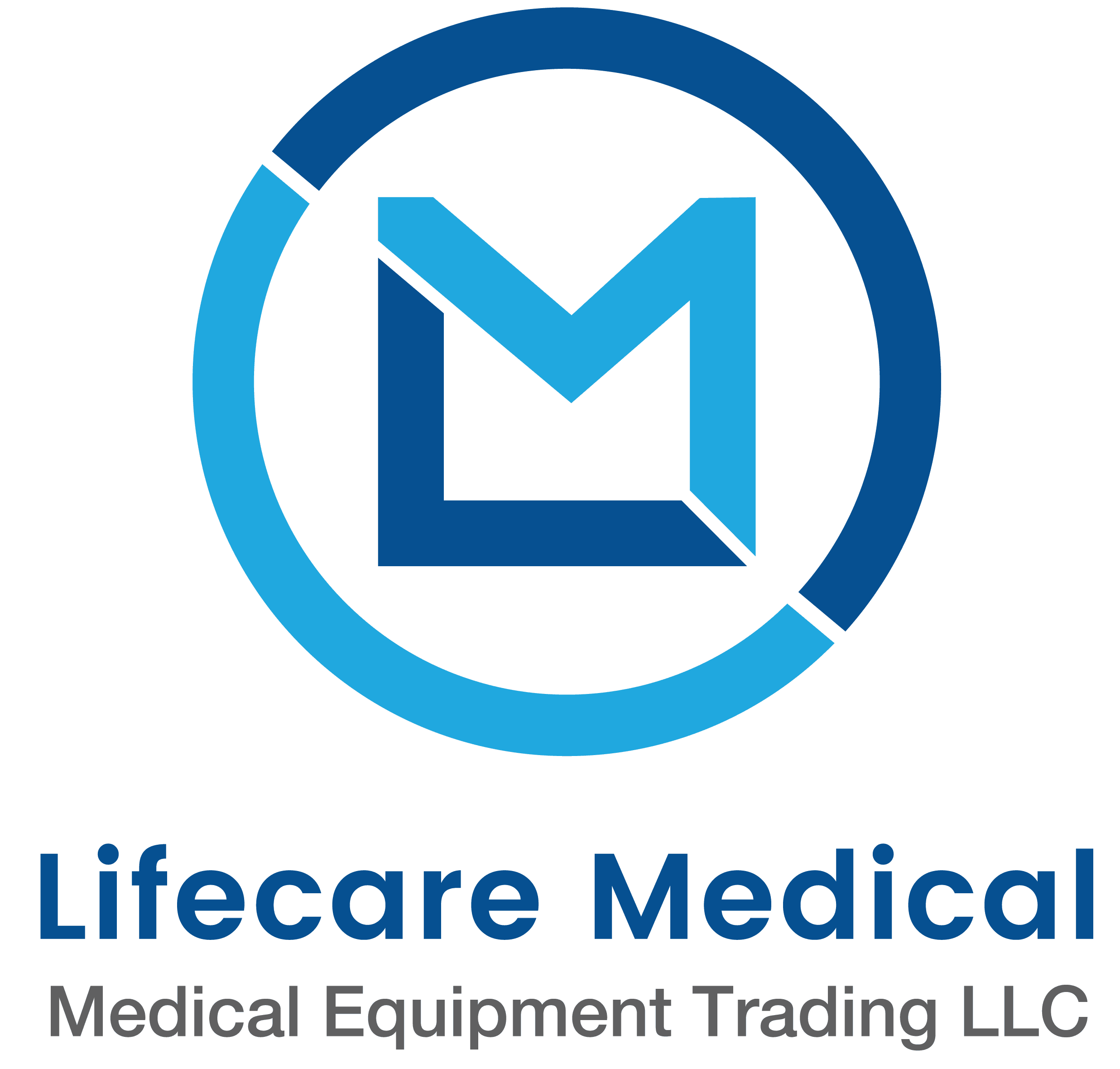Blogs

Smart Healthcare Surge: How Digitalization, AI, and Global Investment Are Transforming the UAE Medical Equipment Market by 2025
The medical equipment market in the UAE is growing like never before. It is expected to reach from $2.1 billion in 2024 to $2.8 billion by the end of 2025. As the leader of health care innovations in the middle east, UAE receives global investments, private initiatives and government led support systems. This is nothing but a massive opportunity for decision makers and investors in the healthcare sector. The demand for medical equipment suppliers in the UAE is only set to grow. The main factors defining the changing landscape are global investments, digitalisation, and technological innovations like AI marking UAE among global centres for medical expertise.
Strong Market Growth and Investment
The market for medical equipment suppliers in UAE is steadily growing and is expected to cross $2.8 billion in 2025. This is at a rate of 15.2 CAGR, which is much higher than the regional index. By 2024, especially after the covid waves, the healthcare industry in UAE has faced a massive transformation, which led to numerous global deals and investments in the sector.
This change is made possible by mainly two factors :
Government support
- The health strategies adopted by the government from 2021-2025, specifically gives importance to the improvements in technology in healthcare.
- UAE Vision 2071 considers healthcare as a major pillar driving overall economic growth.
- There are special healthcare zones across the Emirates that offer tax reductions and legal benefits that help in attracting investments and encourage technological and innovative growth.
Foreign investment
- North American startups giving focus on AI and technology in healthcare are growing in the region.
- UAE is a perfect gateway to enter the business in the Gulf region, for Asian manufacturers and suppliers.
- There are multiple European medtech firms setting their headquarters in the UAE.
Digital Health, AI, and Connected Devices
The UAE is at the forefront of digital transformation in healthcare in the Middle East. It is predicted that by 2026, 67-70% of UAE hospitals will be using AI powered tools and softwares for diagnostics and treatment. This is not only for improving the quality and convenience for the patients, but also helps the hospitals to cut their operational costs.
Analytics based prediction systems in healthcare helps in early diagnostics and detection. Another advantage is using IoT-enabled devices that allow real-time monitoring to improve the quality of treatment. This helps to cut the costs by a solid 25% with tools like telehealth platforms, smart diagnostics, and wearable monitors.
These factors create a golden opportunity for medical equipment suppliers in the UAE, as both hospitals and patients prefer a more accurate and quick system.
Rising Demand for Diagnostic and Orthopedic Devices
There is a constant change in lifestyle and demographics over the years. This results in an increase of chronic and lifestyle illnesses. Also, the population over 65 is also growing annually at 8.5%. This demands for a growth in healthcare as well. There is high demand for automated lab equipment, point-of-care devices, MRI, and CT systems.
The market for orthopedic equipment is also growing. The surge in sports tourism and active lifestyle demands changes in sports medicine. Therefore technologies like titanium implants, 3D-printed prosthetics, and robotic-assisted surgery are taking the market. High-end hospitals are especially interested in minimally invasive orthopedic equipment.
Medical equipment suppliers in the UAE can take advantage of these opportunities by partnering with premium healthcare providers, sports medicine facilities, and medical tourism establishments and make cutting-edge equipment accessible to the public at premium qualities.
Emphasis on Localization and Contract Manufacturing
To reduce the dependence on imports, and to promote local business, the UAE is actively encouraging localization. “Made in UAE” campaigns and 50% corporate tax reductions for local partners are encouraging manufacturers to set up local production, enhancing supply chain resilience.
Establishing manufacturing and supply chains within the country is in fact a strategic move, because the cost of production is 25-30% lower than in Europe.Besides, it also gives a geographical advantage due to the easy access to the GCC, Africa, and South Asia. Moreover, the local production helps in faster approval processes.
Multinational medtech companies have already established operations in Dubai Healthcare City and Jebel Ali Free Zone, establishing hubs for distribution and manufacturing. For medical equipment suppliers who are prepared to invest in localized operations in the UAE, this is the best time.
Challenges: Import Dependence and Regulatory Compliance
Even with all this growth, there are still shortages and scope for more. Currently, 78% of medical equipment needs to be imported, causing higher rates of transportation costs for healthcare providers and suppliers, along with import tariffs, and worldwide disruptions.
The legal and regulatory environment also needs to be considered. The UAE Ministry of Health has strict laws for quality and management.In addition, international certifications such as FDA, CE, and ISO are still required to launch the products in the UAE market. All these procedures and paperworks might cause a delay of 6-12 months, which signals the need to strategically plan and prepare in advance.
Building trustworthy relationships, establishing UAE-based testing laboratories, and implementing quality management systems are important for the medical equipment suppliers in UAE to be a success and to capture the market.Creating strong local distribution networks is another crucial success element.
Sustainability and Eco-Friendly Innovations
The improved awareness on sustainability is transforming the sourcing and supplier selection. Healthcare institutions are switching to more ethical options, such as energy efficient and environment friendly technology, powered by the UAE Net Zero 2050 vision. Unlike plastics that were previously used and easily sourced, many institutions now promote the use of disposables that are Biodegradable. There is also an increasing support for efficient reusing and recycling programs.
Eco-friendly alternatives is not only about the conscious choice to greener healthcare, but it is also helping to cut costs in terms of long term energy conservation and waste management. Further, Medical equipment suppliers in the UAE, who follow ESG principles receive government subsidies and incentives promoting sustainable healthcare solutions.
In this industry, sustainability is no longer an afterthought; it provides a competitive advantage that influences supplier’s reputation and investor attraction.
To conclude, the success in the medical equipment industry in UAE will go to investors, manufacturers, and suppliers that embrace AI-driven innovation, regional production, and sustainable practices. Now is the time to put your company at the center of this $2.8 billion healthcare shift.
